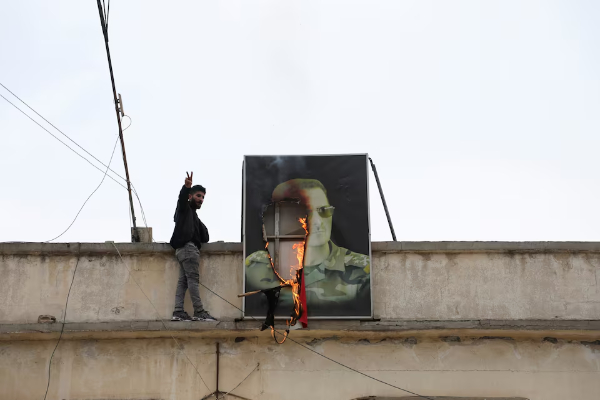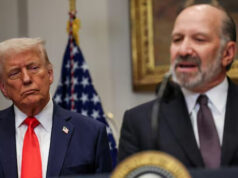
On Monday, Syrians faced a hopeful yet uncertain future as rebels captured Damascus, prompting Syria President Bashar al-Assad to flee to Russia, ending 13 years of civil war and over five decades of his family’s oppressive rule.
With a curfew declared by the rebels, Damascus was calm after dawn, with shops closed and streets largely empty. Most of those out were rebels, and many cars bore licence plates from Idlib, the northwestern province from which the fighters launched their lightning advance just 12 days ago.
Firdous Omar, from Idlib, among a group of fighter rebels in central Umayyad Square, said he had been battling the Assad regime in Syria since 2011 and was now looking forward to laying down his weapon and returning to his job as a farmer.
“We had a purpose and a goal and now we are done with it. We want the state and security forces to be in charge.”
West Asia Instability
The lightning advance of a militia alliance spearheaded by Hayat Tahrir al-Sham (HTS), a former al Qaeda affiliate, was a generational turning point for West Asia.
It ends a war that killed hundreds of thousands of people, caused one of the biggest refugee crises of modern times and left cities bombed to rubble, swathes of countryside depopulated and the economy hollowed out by global sanctions. Millions of refugees could finally go home from camps across Turkey, Lebanon and Jordan.
Assad ‘s fall in Syria wipes out one of the main bastions from which Iran and Russia wielded power across the region while Turkey, long aligned with rebels, emerges strengthened, while Israel hailed it as an outcome of its blows to Assad’s Iranian-backed allies.
The Arab world faces the challenge of reintegrating one of West Asia’s central states, while containing the militant Sunni Islam that underpinned the anti-Assad revolt but has also metastasized into the horrific sectarian violence of Islamic State.
HTS is still designated as a terrorist group by the United Nations and most countries, but has spent years trying to soften its image and distance itself from its al Qaeda roots to reassure foreign states and minority groups within Syria.
New History
The group’s leader, Ahmed al-Sharaa, better known as Abu Mohammed al-Golani, vowed to rebuild Syria.
“A new history, my brothers, is being written in the entire region after this great victory,” he told a huge crowd at ancient Umayyad Mosque in Damascus on Sunday. With hard work Syria would be “a beacon for the Islamic nation”.
Assad’s prime minister, Mohammed Jalali, told Sky New Arabia he would be willing to meet with Golani and was ready to provide documents and assistance for the transfer of power. He said he had no answer to the fate of the Syrian army.
“It is a question left to the brothers who will take over the management of the country’s affairs, what concerns us today is the continuation of services for Syrians,” he said.
Freeing Prisoners
The Assad police state was known for generations as one of the harshest in the Middle East, holding hundreds of thousands of political prisoners. On Sunday, elated inmates poured out of jails. Reunited families wept in joy. Newly freed prisoners were filmed running through the Damascus streets holding up their hands to show how many years they had been in prison.
The White Helmets rescue organisation said it had dispatched emergency teams to search for hidden underground cells still believed to hold detainees.
One of the final areas to fall to the rebels was the Mediterranean coast, heartland of Assad’s Alawite sect and site of Russia’s naval base.
Looting took place in the coastal city of Latakia on Sunday but had subsided on Monday, residents said, with few people in the streets and shortages of fuel and bread.
Two Alawite residents said that so far the situation had panned out better than they thought, seemingly without sectarian retribution against Alawites. One said a friend had been visited at home by rebel fighters who told him to hand over any weapons he had, which he did.
Near Latakia, rebels had yet to enter the Assad family’s ancestral village of Qardaha, site of a huge mausoleum for Assad’s father who took power in the 1960s. A resident said all senior figures tied to Assad and his rule had left.
“Only the poor are left here. The rich guys and thieves are gone,” he said.
Israel, U.S. Launch Strikes
Israel said Assad’s fall was a direct consequence of Israel’s punishing assault on Iran’s Lebanese allies Hezbollah, who had propped up Assad for years but were decimated since September by an Israeli air and ground campaign.
On Sunday, Israel struck sites linked to Iran in Syria. It has also pushed tanks over the border into a demilitarised buffer zone to prevent a spillover from the turmoil there, but says it intends on staying out of the conflict. On Monday the Israeli military published photos of its forces in the Mount Hermon border area.
The United States, which has 900 soldiers on the ground in Syria operating alongside Kurdish-led forces in the east, said its forces hit around 75 targets in air strikes against Islamic State camps and operatives on Sunday.
“There’s a potential that elements in the area, such as ISIS, could try to take advantage of this opportunity and regain capability… Those strikes were focused on those cells,” Secretary of Defense Lloyd Austin said during a visit to Japan.
(With inputs from Reuters)




